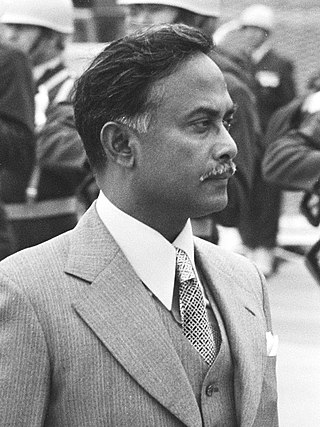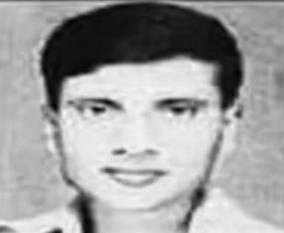| 1976 Bogra mutiny | |||||||
|---|---|---|---|---|---|---|---|
| |||||||
| Belligerents | |||||||
| | |||||||
| Commanders and leaders | |||||||
| | |||||||
The 1976 Bogra mutiny was a rebellion on 30 April 1976 of Bangladesh Army soldiers stationed in Bogra Cantonment.
| 1976 Bogra mutiny | |||||||
|---|---|---|---|---|---|---|---|
| |||||||
| Belligerents | |||||||
| | |||||||
| Commanders and leaders | |||||||
| | |||||||
The 1976 Bogra mutiny was a rebellion on 30 April 1976 of Bangladesh Army soldiers stationed in Bogra Cantonment.
Sheikh Mujibur Rahman and most of his family were killed in the 15 August 1975 Bangladeshi coup d'état by officers and soldiers of the Bangladesh Army. [2] [3] [4] Khondker Moshtaq Ahmed became president of Bangladesh and praised the killers of Sheikh Mujibur Rahman. [5] The regiments involved in the coup were divided and dispersed to different cantonments around Bangladesh. [6] Officers involved in the coup and killing were given posts in diplomatic missions of Bangladesh. [5]
The Bengal Lancers were directly involved in the coup and killing of Sheikh Mujibur Rahman. [6] They were posted to Bogra Cantonment and their officers were sent into diplomatic posting outside of Bangladesh. [6] [7] Major General Ziaur Rahman, chief of Bangladesh Army, had difficulty moving the Bengal Lancers to Bogra but was forced after Air Vice Marshall Muhammad Ghulam Tawab, Chief of Bangladesh Air Force, threatened to use Air Force aircraft against the Bengal Lancers. [6]
Tawab, a rightwing figure in the pro-Islamic faction of the armed forces, [8] was secretly behind a large March 1976 religious gathering that demanded Islamic provisions in the constitution. [9] He and the other coup plotters wanted Bangladesh to become an Islamic republic and sought a share of political power. [10] The next month Tawab supports the return of four army officers involved in the assassination of Sheikh Mujibur Rahman and join the Bengal Lancers in Bogra Cantonment. [6]
Lt. Col. (rtd) Khandaker Abdur Rashid flew from Bangkok to Dhaka on 20 April 1976. Rashid spent the next few days discreetly activating members of his old outfit (2nd Field Artillery), and of Lt. Col. (rtd) Syed Faruque Rahman's former armoured command, which had been split into the Bengal Lancers at Bogra and the 1st Bengal Cavalry at Savar. [11] Faruque arrived in Dhaka by air from Singapore on 23 April. He was warmly welcomed by his tank crews at Savar. [12]
The led to the 1976 Bogra mutiny under Colonel Syed Faruque Rahman, one of officers Tawab helped returned. [13] The government of Bangladesh responded firmly to the mutiny threatening to completely annihilate the unit. [13] Syed Faruque Rahman surrendered on the condition that he will not be tried and be allowed to leave Bangladesh. [13]
After the failed mutiny, Major General Ziaur Rahman retires Tawab, sends the four officers back, and disbands the Bengal Lancers. [6] The 22nd Bengal Regiment mutinied in the 1977 Bogra mutiny to call for the release of Syed Faruque Rahman. [14]

The Bangladesh Armed Forces are the military forces of the People's Republic of Bangladesh. They consist of the three uniformed military services: the Bangladesh Army, the Bangladesh Navy, and the Bangladesh Air Force. The Armed Forces are under the jurisdiction of the Ministry of Defence of the Government of Bangladesh, and are directly administered by the Armed Forces Division of the Prime Minister's Office. The President of Bangladesh serves as the Commander-in-Chief of the Bangladesh Armed Forces. Bangladesh has the third-largest defence budget in South Asia. The Bangladeshi military is also the 35th strongest in the world and the third most powerful military force in South Asia. Border Guard Bangladesh and Bangladesh Coast Guard are under the jurisdiction of the Ministry of Home Affairs during peacetime, but during wartime, they fall under the command of the Bangladesh Army and the Bangladesh Navy, respectively.

Ziaur RahmanBU HJ HOR was a Bangladeshi military officer and politician who served as the sixth President of Bangladesh from 1977 until his assassination in 1981. One of the leading figures of country's independence war, he broadcast the Bangladeshi declaration of independence in March 1971 from Chittagong. He was the founder of Bangladesh Nationalist Party (BNP). He previously served as the third chief of army staff from 1975 to 1978 with a minor break.

Khondaker Mostaq Ahmad was a Bangladeshi politician. He was the Minister of Commerce in the third Mujib Rahman ministry under Sheikh Mujibur Rahman, and assumed the presidency of Bangladesh after the Assassination of Sheikh Mujibur Rahman on August 15, 1975. He praised the assassins as "sons of the sun" and put cabinet ministers loyal to Sheikh Mujibur Rahman in jail. He was himself deposed by another coup, less than three months later on November 3, 1975.
Lt. Col. Abu Taher BU was a Bangladeshi military officer and war hero. He first served in the Pakistan Army, and later defected to the Bangladesh Army during the Bangladesh Liberation War. He crossed into India around early August and reported to the Indian authorities. After a week screening at Dehradun, India, Taher reported to Kolkata, Bangladesh Provincial government at 8 Theatre Rd. He was ordered to report to Sector 11 of Mukti Bahini under command of Major Ziaur Rahman, he became the sector commander after him. He served in BDF from end of August to 2 November 1971. He was awarded the medal Bir Uttom for his gallantry in the liberation war. He was released from military service by Indian military medical board in Pune, India after his leg was amputated. After independence, he was inducted into the Bangladesh Army for administrative retirement with legacy rank of lieutenant colonel. After settling in with family, the government of Bangladesh appointed him with employment at Kumilla. Later Taher turned into a political activist and leader of the left-wing Jatiyo Samajtantrik Dal.

Bangladesh has undergone several changes of government since the Proclamation of Independence in 1971. Between the first recorded coup in August 1975 and the 2009 Bangladesh Rifles revolt, Bangladesh has been through as many as 29 military coups.

Sayed Farooq-ur-Rahman was the chief organizer involved in toppling the Sheikh Mujib regime in Bangladesh. He was convicted and hanged on 28 January 2010 along with co-conspirators Sultan Shahriar Rashid Khan, A.K.M. Mohiuddin Ahmed, Mohiuddin Ahmed, and Mohammad Bazlul Huda in Dhaka Central Jail, Old Dhaka, for the murder of Sheikh Mujibur Rahman, the founding leader. and the first president of Bangladesh. Sayed Farooq-ur-Rahman and his close ally Khandaker Abdur Rashid were the chief organisers of the assassination of Sheikh Mujibur Rahman on 15 August 1975. He was 2IC of the 1st Bengal Lancers Regiment of the Bangladesh Army who led a group of junior army officers in order to overthrow the regime of Sheikh Mujib and install Khondaker Mushtaque Ahmed as president of Bangladesh.

Sheikh Mujibur Rahman, the first president of Bangladesh, was assassinated along with most of his family members during the early hours of 15 August 1975 by a group of Bangladesh Army personnel who invaded his residence as part of a coup d'état. The Minister of Commerce, Khondaker Mostaq Ahmad, immediately took control and proclaimed himself head of an interim government from 15 August to 6 November 1975; he was in turn succeeded by Chief Justice Abu Sayem. The assassination marked the first direct military intervention in Bangladesh's civilian administration. Lawrence Lifschultz characterized this incident as an outcome of the Cold War between the United States-influenced Pakistan and the Soviet Union-influenced India. 15 August was annually observed as National Mourning Day under Sheikh Hasina regime.

Assassination of Ziaur Rahman refers to the killing of Ziaur Rahman, the sixth president of Bangladesh and was assassinated by a faction of officers of Bangladesh Army, on 30 May 1981, in the southeastern port city of Chittagong. Rahman went to Chittagong to arbitrate in a clash between the local leaders of his political party, the Bangladesh Nationalist Party (BNP). On the night of 30 May, a group of officers commandeered the Chittagong Circuit House, a government residence where Rahman was staying, shooting him and several others.
Air Vice Marshal Muhammad Ghulam Tawab was the second chief of the air staff of Bangladesh Air Force who also served as deputy chief martial law administrator of Bangladesh with General Ziaur Rahman and Admiral M. H. Khan from 1975 to 1976.

The Bangladesh Freedom Party, also known as Freedom Party is a political party founded by Sayed Farooq-ur-Rahman, Khandakar Abdur Rashid and Bazlul Huda who were the chief organisers of the assassination of Sheikh Mujibur Rahman on 15 August 1975.
Major General Khaled Mosharraf was assassinated on November 7, 1975. He was a Bangladeshi military officer who was the Sector Commander of Bangladesh Forces Sector 2 and K-Force Brigade Commander during the Bangladesh Liberation War.

Abu Taher Mohammad Haider, Bir Uttom was a Bangladesh Army officer and recipient of Bir Uttom, the second highest military award in Bangladesh. He fought in the Bangladesh Liberation War as the second-in-command of the K force under Khaled Mosharraf. Later he became the sector commander of sector-2 from 22 September 1971. After the assassination of the President of Bangladesh, Sheikh Mujib in a military coup; he joined a counter coup led by his former commander Major General Khaled Mosharraf. He was killed in a situation marred with confusion along with Khaled Mosharraf on 7 November 1975 by proponents of a counter coup led by Colonel Abu Taher.
The 1977 Bogra mutiny was a mutiny in Bogra Cantonment, a military station near the city of Bogra in Bangladesh on 30 September 1977.

The military coup in Bangladesh on August 15 of 1975 was launched by mid-ranking army officers in order to assassinate founding president Sheikh Mujibur Rahman, whose administration post-independence grew corrupt and reportedly authoritarian until he established a one-party state-based government led by the socialist party Bangladesh Krishak Sramik Awami League. Mujib, along with his resident family members, were killed during the coup but was survived by his two then-expat daughters, one of them being future prime minister Sheikh Hasina. The officers were led by Capt. Abdul Majed, Major Sayed Farooq-ur-Rahman, Major Khandaker Abdur Rashidand Major Shariful Haque Dalim.

The 7 November 1975 Bangladesh coup d'état, also known as the Sipahi–Janata Revolution, was launched by left-wing soldiers (Sipahi) of Biplobi Shainik Sangstha (BSS) under the leadership of Col. (retd.) Abu Taher.
The 3 November coup d'état was organised by Brig. Khaled Mosharraf against President Khondaker Mostaq Ahmad to remove him from the presidency and the assassins of Sheikh Mujibur Rahman from power: Capt. Abdul Majed, Maj. Syed Faruque Rahman, Maj. Khandaker Abdur Rashid and Maj. Shariful Haque Dalim. The coup resulted a return of Mujibist forces in Bangladeshi politics for a short time.

Mohammad Kismat Hashem was a Bangladesh Army officer who was convicted for his role in the 1975 Jail Killing of four senior Awami League leaders following the assassination of Sheikh Mujibur Rahman, the president of Bangladesh.
Abdul Wahab Joardar is a Bangladesh Army non-commissioned officer who is known for his role in the assassination of Sheikh Mujibur Rahman, the founding president of Bangladesh.

Abu Yousuf Mohammad Mahfuzur Rahman, also known as A.Y.M. Mahfuzur Rahman, was a Bangladeshi army officer who served as a sub-sector commander during the Bangladesh Liberation War. In 1981, he was executed for his alleged involvement in the assassination of president Ziaur Rahman.

Beginning on 9 October 1977, the government of Ziaur Rahman carried out mass executions of military personnel, following a series of attempted coups in Bangladesh. According to official records, 1143 members of the Bangladesh armed forces were hanged in two months, following 9 October 1977. This was the first mass execution of military personnel on this scale in South Asia.